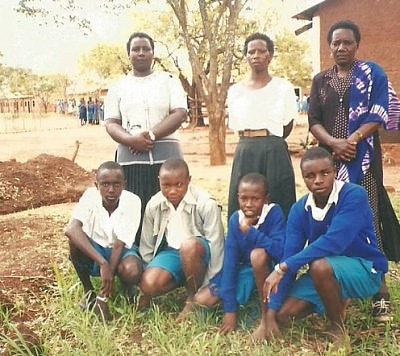Mr. Mumo Goes to Washington

Peter Mumo vividly remembers what it was like as a kid in rural Kenya. His mother, a farmer, struggled to put food on the table because her fields were often devastated by drought and erratic rains. His father, a primary school teacher, had one of the lowest-paying professions in Kenya. As a result, between he and his five brothers, food was anything but plentiful.

Peter Mumo
So when the U.N. World Food Programme started providing school meals in his classroom, he recalls it as “one of the happiest days at school.” These simple lunches of corn and peas, biscuits or porridge gave him the nutrition he needed to excel in school and chart a path forward to becoming an engineer. Now he’s flipping the script to create innovative ideas to reduce food waste and support sustainable agriculture in Kenya.
On our latest Hacking Hunger podcast, WFP USA’s M.J. Altman talks to Peter, a Mandela Washington Presidential Fellow for Young African Leaders, about what it was like to share a scarce amount of food with his brothers growing up, how he’s helping transform the way his homeland feeds its people and his reflections on meeting President Obama in Washington, D.C.
BELOW ARE A FEW EXCERPTS:
On what it was like for Peter to grow up hungry with five brothers:
“We learned how to share but we were very fast in eating. Every time we were served, we would eat everything and my mother would be like, are you guys well? And we’d be quiet. And she’d just say, it’s ok, tomorrow I’m going to cook more. That was the routine. So we never used to have that opportunity to know that tomorrow we are going to have a better meal.”
How school meals changed life for him and his fellow students:
“We were more lively, we were having more fun as kids. We used to go out for our break hour and play together and make fun and everything because we knew, we are going to have some food over lunch hour. We looked forward to that particular hour of lunch, to go out there and get the food. So generally the mood was good and more and more kids enrolled to school. ”
On his project exploring how to process mangos into mango powder to prevent food loss:
“So why mango powder? We thought the challenge of storage was huge and if you store mango in the form of mango puree or juice or anything, you need a very huge storage facility. If you dry mango into powder, it will need a very small storage space. Two, you will be able to store it longer. And there you will be able to use it in a wider market, in the confectionary industry, in the food blending industry.”
Click here to listen to this podcast. Search for and subscribe to Hacking Hunger on iTunes, Stitcher, Soundcloud, and TuneIn Radio.




